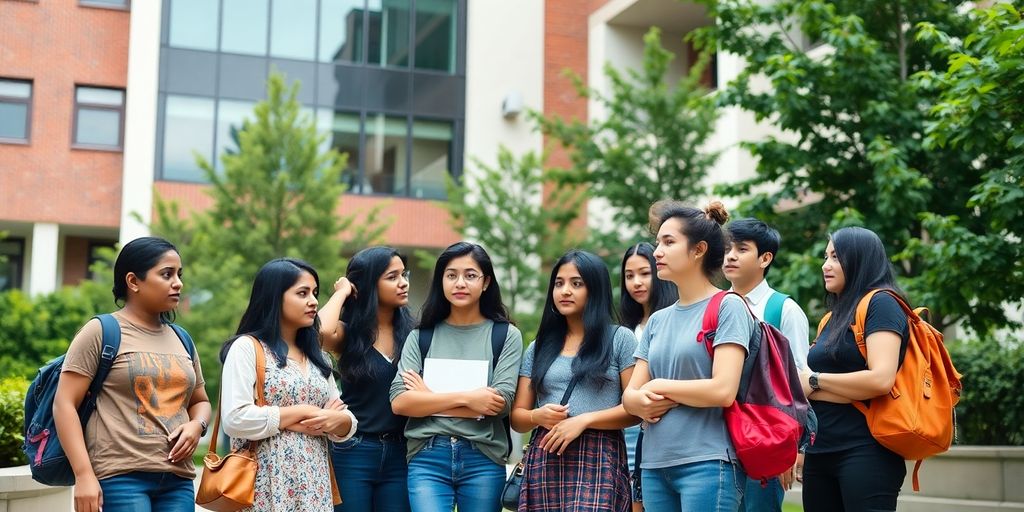Child Welfare
U.S. Government Cracks Down on Student Visas Amid Activism Concerns

The U.S. government has intensified its efforts to revoke student visas, particularly targeting foreign students involved in activism. This move, largely attributed to the Trump administration, has raised concerns about free speech and the treatment of international students in the U.S.
Key Takeaways
- Over 300 student visas have been revoked, primarily affecting those involved in pro-Palestinian activism.
- The State Department is using broad powers to terminate visas based on perceived threats to U.S. foreign policy.
- Many students report being unaware of their visa revocations until confronted by immigration officials.
Background on Visa Revocations
The U.S. has a complex visa system, with student visas being crucial for international scholars. The F-1 visa is the most common for academic students, while the J-1 visa is used for exchange visitors. The recent crackdown has seen the State Department and Immigration and Customs Enforcement (ICE) take aggressive actions against students, often without prior notice.
Recent Incidents
Several high-profile cases have emerged, highlighting the administration’s approach:
- Rümeysa Öztürk, a Tufts University doctoral candidate, was arrested on the street after her visa was revoked without her knowledge. She was accused of supporting Hamas, a claim her lawyers contest as politically motivated.
- Alireza Doroudi, a doctoral student from Iran, was detained near his home, with little information provided about the reasons for his arrest.
- Mahmoud Khalil, a green card holder and Columbia University student, is currently fighting deportation after being detained for his activism.
These cases illustrate a troubling trend where students are targeted for their political beliefs rather than any criminal activity.
Government Justifications
Secretary of State Marco Rubio has stated that the administration is focused on removing individuals whose activities could pose a threat to U.S. foreign policy. This justification has raised alarms among civil rights advocates, who argue that it undermines the fundamental rights of free speech and assembly.
Impact on International Students
The crackdown has created a chilling effect on international students, many of whom feel unsafe expressing their views. Universities are also caught in a difficult position, as they navigate the pressures from the government while trying to support their students. Some institutions have reported learning about visa revocations only through government databases, leaving them unable to assist affected students effectively.
Conclusion
The U.S. government’s actions against student visa holders signal a significant shift in immigration policy, particularly concerning those engaged in activism. As the situation evolves, the implications for international students and the broader academic community remain uncertain, raising critical questions about the future of free expression in U.S. higher education.
Sources
-

 Press Release6 days ago
Press Release6 days agoClinical Trials Market Set for Robust Growth, Driven by Drug Development Surge and Digital Innovation
-

 Press Release7 days ago
Press Release7 days agoGreen Bio Chemicals Market Poised for Sustainable Growth amidst Global Shift to Eco-Friendly Alternatives by 2035
-

 Press Release6 days ago
Press Release6 days agoFill-Finish Pharmaceutical Contract Manufacturing Market Expected to Flourish Amid Biopharmaceutical Boom and Global Outsourcing Trend by 2035
-

 Press Release6 days ago
Press Release6 days agoIndustrial Boiler Market Expected to Surpass USD 24.4 Billion by 2035 Amid Growing Demand for Energy Efficiency and Industrialization
-

 Press Release6 days ago
Press Release6 days agoPreventive Vaccines Market to Witness Strong Growth by 2035
-

 Press Release7 days ago
Press Release7 days agoPet Food Nutraceutical Market Set for Robust Expansion Amid Rising Demand for Pet Wellness by 2035
-

 Press Release6 days ago
Press Release6 days agoPediatric Vaccines Market: Safeguarding Futures, Driving Growth
-

 Press Release7 days ago
Press Release7 days agoCat Food Market Forecast 2035: Natural Ingredients, Pet Wellness to Lead the Way










